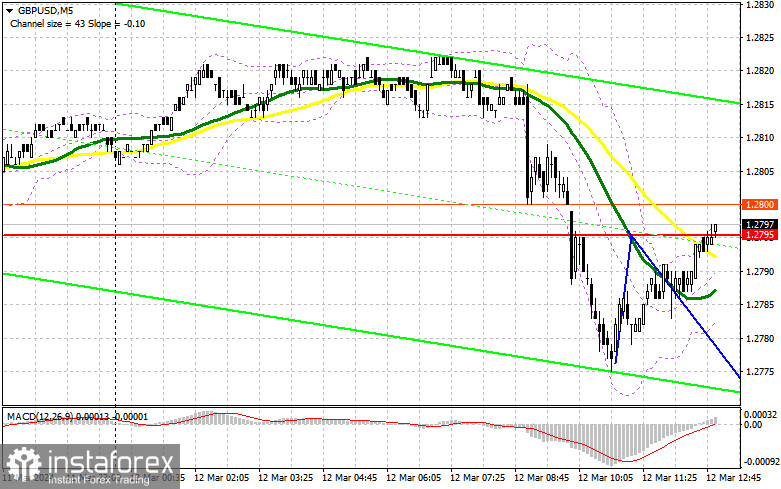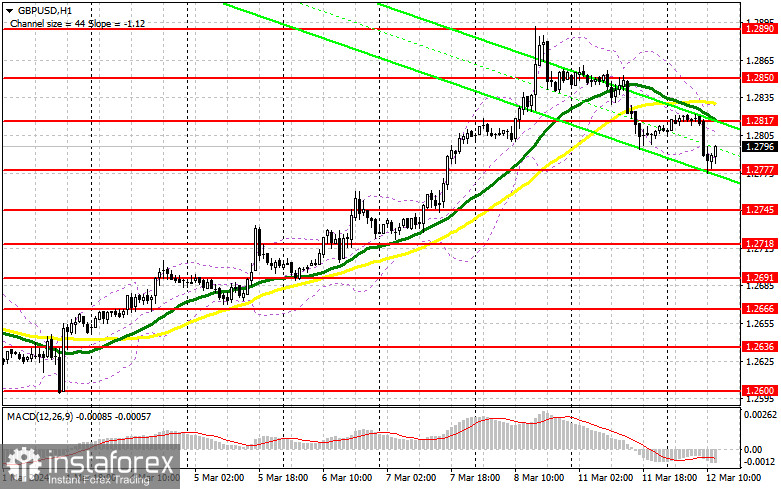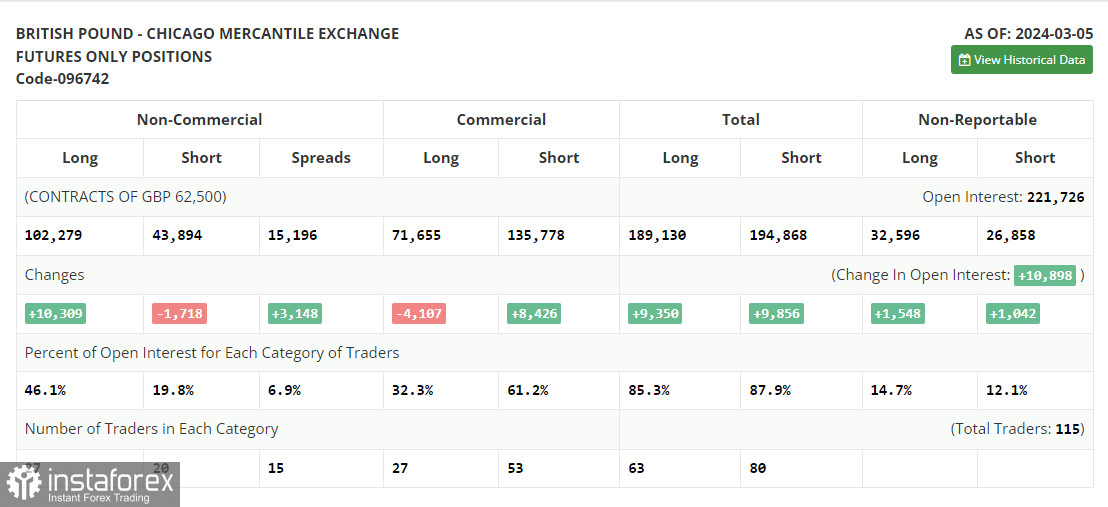In my morning forecast, I paid attention to the 1.2795 level and planned to make decisions on entering the market from it. Let's look at the 5-minute chart and figure out what happened there. A breakthrough of 1.2795 occurred, but it never reached the bottom-up reverse test. As a result, it was not possible to obtain suitable entry points into the market. In the afternoon, the technical picture was revised.

To open long positions on GBP/USD, it is required:
Weak data on the growth of the unemployment rate in the UK and a decrease in average earnings led to a drop in the pair in the first half of the day, but buyers took advantage of this moment, although not where I expected. We have data on inflation in the United States ahead, and if prices fall sharply in February this year, it is obvious that the position of the US dollar will weaken, which will lead to a new wave of growth in the pound and a resumption of the bullish trend. In case of a decline in the pair, I prefer to act after the formation of a false breakdown in the area of the new support of 1.2777, formed at the end of the first half of the day. This will provide a suitable entry point into long positions, counting on the continuation of the bullish trend with the prospect of updating 1.2817 – a new resistance, where buyers are sure to face serious problems. There are also moving averages. A breakout and consolidation above this range will strengthen demand for the pound and open the way to 1.2850, which will strengthen the position of the bulls. The farthest goal will be a maximum of 1.2890, where I'm going to fix the profit. In the scenario of a decline in the pair and a lack of activity on the part of the bulls at 1.2777 in the afternoon, the pound may drop even further. In such a case, only a false breakout around the next support at 1.2745 will confirm the correct market entry point. I plan to buy GBP/USD immediately on the rebound from the minimum of 1.2718, with the target of a correction of 30-35 points within the day.
To open short positions on GBP/USD, the following is required:
The bears need to stay below 1.2817. A false breakout at this level after the release of US inflation data will be an excellent confirmation of the sell signal for further downward correction, leading to a downward movement with the target of testing 1.2777. Breaking and reverse testing this range from bottom to top will deal another blow to the positions of the bulls, pushing the pair to 1.2745, where I expect the appearance of major buyers. The ultimate target will be the area of 1.2718, where profit will be fixed. In the case of an increase in GBP/USD and the absence of activity at 1.2817 in the second half of the day, buyers will again feel the strength, anticipating further development of the upward trend. In such a case, I will postpone sales until there is a false breakout at the level of 1.2850. If there is no downward movement there, I will sell GBP/USD immediately on the rebound from 1.2890, but I am only expecting a pair correction down by 30-35 points within the day.

In the COT report (Commitment of Traders) for March 5, there was an increase in long positions and a decrease in short positions. Despite the latest inflation data and statements from Bank of England representatives that rates may be lowered even if inflation does not reach the targeted 2.0%, the pound continues to see an increase in long positions. This may be associated with the Federal Reserve's soft position. Inflation data this week may strengthen market participants' expectations that the committee will resort to a rate cut in the near future, which should weaken the dollar and strengthen demand for the relatively cheap British pound over the past years. The latest COT report states that long non-commercial positions increased by 10,309 to the level of 102,279, while short non-commercial positions decreased by 1,718 to the level of 43,894. As a result, the spread between long and short positions increased by 3,148.

Indicator signals:
Moving averages:
Trading is conducted below the 30 and 50-day moving averages, indicating a further decline in the pair.
Note: The period and prices of moving averages are considered by the author on the hourly chart H1 and differ from the general definition of classic daily moving averages on the daily chart D1.
Bollinger Bands:
In case of a decline, the lower boundary of the indicator at 1.2777 will act as support.
Description of indicators:
- Moving Average (MA, determines the current trend by smoothing volatility and noise). Period – 50. Marked on the chart in yellow.
- Moving Average (MA, determines the current trend by smoothing volatility and noise). Period – 30. Marked on the chart in green.
- MACD indicator (Moving Average Convergence/Divergence – convergence/divergence of moving averages). Fast EMA – 12 periods. Slow EMA – 26 periods. SMA – 9.
- Bollinger Bands (Bollinger Bands). Period – 20.
- Non-commercial traders – speculators, such as individual traders, hedge funds, and large institutions, using the futures market for speculative purposes and meet specific requirements.
- Long non-commercial positions represent the total number of long open positions held by non-commercial traders.
- Short non-commercial positions represent the total number of short open positions held by non-commercial traders.
- The total non-commercial net position is the difference between short and long positions of non-commercial traders.





















